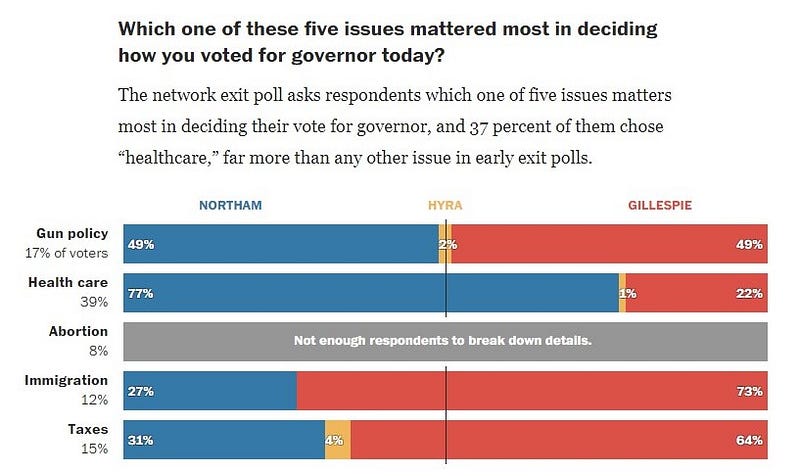To: Interested Parties
From: Brad Woodhouse, Protect Our Care Campaign Director
Date: November 8, 2017
Re: A Great Week For Health Care (And It’s Only Wednesday) — Open Enrollment Surges, VA Voters Reject Repeal and Maine Votes for Medicaid Expansion
— — — — — — — — — — — — — — — — — — — — — — — — — — — — — — — — — — — — — — — — — — — — — — — — — — — — — — — — — — — — — — — — — — — — — —
When Donald Trump was elected president a year ago, he and Republicans in Congress believed they would move quickly to repeal our health care. They were wrong. And last night, voters sent a resounding message: stop trying to take away and sabotage our health care. From Virginia and Maine to state legislative races across the country, voters made clear they reject partisan repeal and are looking for bipartisan solutions that build on the successes of the Affordable Care Act and lower costs and expand access.
This has been a good week for health care — and it’s only Wednesday.
First, we’re seeing a surge in open enrollment as people find affordable plans. Open enrollment began on November 1 and ends on December 15. Despite the Trump administration’s efforts to sabotage open enrollment — from cutting outreach advertisements by 90 percent and scheduling maintenance for Healthcare.gov during traditionally high sign-up times — people across the country are signing up for coverage. In fact, more than 200,000 people picked a plan on the first day of open enrollment — November 1 — more than double the number of people who chose a plan on the first day of last year’s open enrollment. Traffic to Healthcare.gov has increased 33 percent from last year. And the reason is simple: they can find an affordable plan that works for them and their budget. 8 out 10 can find a plan for less than $75 and most can find a plan for less than $50 per month. While people who receive financial help should see lower costs across the board, this year, bronze plans are much cheaper. In fact, in 85% of American counties a 55 year old couple making $40k a year can find a bronze plan for $0 per month.
Second, voters across the country rejected health care repeal and sabotage and supported pro-health care candidates. From Virginia to New Jersey to Maine and all around the country, voters rejected candidates who backed the GOP’s agenda of health care repeal and sabotage and embraced candidates who supported quality, affordable coverage for everyone.
- In the Virginia gubernatorial race, health care was the #1 issue to voters (39%) — more than double any other issue. Among those voters, Ralph Northam beat Ed Gillespie by 54 points (77% to 23%). A new PPP poll showed voters said Gillespie’s support for repealing the Affordable Care Act made it less likely to vote for him by a 24 point margin, and 47 percent of voters said Ralph Northam’s approach to health care made them more likely to vote for him.
- In Virginia delegate races, candidate after candidate backed Medicaid expansion and came away with upset wins.
- In the New Jersey gubernatorial race, among the 19% who ranked health care their top issue, voters preferred Phil Murphy over Kim Guadagno, who opposed the Affordable Care Act, by 74 points (86–12).
- In New Hampshire, Manchester Mayor-Elect Joyce Craig broke with the incumbent mayor to endorse Medicaid expansion and won a decisive victory.
- In Florida, St. Petersburg Mayor Rick Kriseman, an outspoken supporter of the Affordable Care Act, was re-elected in a hotly-contested race.
- In Georgia, two new state House members who won major upset victories backed Medicaid expansion, while their Republican opponents refused to do so.
Third, the Affordable Care Act’s Medicaid Expansion proposal won on the ballot. In the first popular vote of its kind, Mainers voted to expand Medicaid, a key component of the Affordable Care Act that would provide access to coverage to 80,000 Mainers and create 3,000 jobs, by nearly 20 points with 59% of the vote. There was widespread support for the measure in all parts of the state, including rural areas. Unfortunately, Governor Paul LePage said he would continue to sabotage health care and not implement the policy. We need to continue to hold him and others who sabotage our care accountable.
What Does This Mean?
There are a few key lessons we should take away from this week.
- Despite President Trump’s sabotage efforts and proclamation that the ACA is dead, people want affordable coverage and trust the ACA to provide it. The surge in sign-ups during the first week of open enrollment show people want to have quality, affordable coverage, despite all the fights going on in Washington, DC.
- People overwhelmingly reject health repeal and sabotage. Last night’s election results are consistent with polls throughout this year that reject President Trump’s and Republican efforts to repeal and sabotage health care and want to find bipartisan solutions to improve health care. Those who continue to support these repeal efforts will pay a political price.
- Health care is a winning issue and support for repeal is a loser. Candidates who embraced expanding coverage and providing quality, affordable health care to everyone were rewarded last night. Health care is a voting issue.
- Voters want a bipartisan approach to health care. Members of Congress should listen to the message voters sent last night and pass the bipartisan proposal sponsored by Senators Lamar Alexander (R-TN) and Patty Murray (D-WA) that would reject repeal, keep premiums low and stabilize the marketplace.


